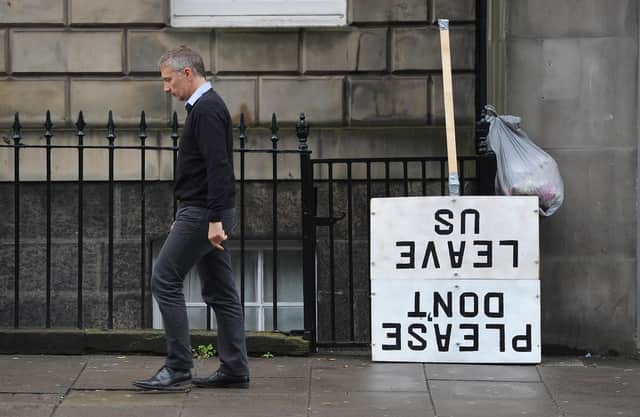Scottish independence: Are unionists giving up the fight because of referendum fatigue? – Bill Jamieson


Indyref Two? Why bother with the formality of another vote? A victory for independence now looks all over bar the shouting – though never under-estimate the appeal to Scots of a good shout.
Poll guru Sir John Curtice believes that for the first time in Scottish history, the ‘Yes’ side is the favourite to win a second independence referendum.
Advertisement
Hide AdAdvertisement
Hide AdHe points to a series of recent surveys showing increased support for Scottish independence. Panelbase studies published in June and July found 54 per cent of Scots now back a Yes vote, a five-point surge since March.
The survey also shows a commanding lead for the SNP heading into next year’s Holyrood elections, with a resounding victory for Nicola Sturgeon likely to heighten calls for a second referendum.
“One has to say,” Sir John concluded, “this is the longest period of time over which we’ve had support for Yes averaging ahead of support for No.”
Yet formal campaigning looks a long way off. Battle lines have still to be formed and barely a campaign shot has yet to be fired.
More pressing concerns
Of course, First Minister Nicola Sturgeon and the SNP army have not let an opportunity pass to put the case for a second referendum. Every clash with the UK Government at Westminster, every grumble – new or re-hashed – feeds the grievance mill. The case for Scottish distinctiveness and difference is pushed at every turn.
But in all this, there is a striking absence: vigorous engagement by the unionist side. It’s like Bannockburn with no sign on the horizon of the opposing team.
What ails the unionist cause? Now, these are early days. There are more immediate and pressing matters – concern over a renewed coronavirus outbreak, the looming jump in unemployment, an economy in recession and business failures rising by the week. Why expend political energy on a second referendum that has still to be agreed, and the public so preoccupied?
It may be the persona of Prime Minister Boris Johnson does not appeal to Scottish sensibilities: too southern English, too posh boy, not serious or engaging enough.
Advertisement
Hide AdAdvertisement
Hide AdIt could be that the Prime Minister has had a bad Covid war – inaction at the start, complacency, delays in lockdown and getting PPE equipment to hospitals, confusing messages, breaches of lockdown by government ministers, poor roll-out of test-and-tracing and now conflicting advice on where and when facemasks must be worn. And all this as debt and deficit figures spiral upwards and the economy is being pulverised by the biggest downturn in decades.
Shouty TV confrontations
Little wonder UK Government poll ratings have tumbled while Nicola Sturgeon is widely viewed as being more competent and certainly less accident-prone.
But I suspect the main problem for the unionists lies elsewhere: an utter weariness. Combat lassitude has set in, a collective sigh and groans at the prospect of having to face yet another prolonged and bruising independence battle.
The indyref campaign in 2014 was a bitter and hugely divisive affair, with shouty TV studio confrontations and communities and families split. The final vote seemed decisive at the time, with 55 per cent voting against independence and 45 per cent voting in favour. Issues such as which currency would be adopted on independence and membership of the EU featured prominently.
Are the unionists game for a second run? It is hardly a prospect they view with enthusiasm; “not all that again!” seems to capture the mood.
In stark contrast, there is no such diminution of support and fighting spirit on the independence side. Amid the ranks of previous unionist voters there is little appetite for a re-run of a vote they were assured would stand for a generation. And enthusiasm – if such there is – has been further drained by the raucous three-year battle over Brexit and now the onslaught of Covid. Unionism may now be suffering the political equivalent of metal fatigue.
Now the political mood can quickly change once battle proper is engaged. Many expressing support for independence in an opinion poll now may hesitate once in the nitty-gritty of battles with the Westminster equivalent of Michel Barnier, massive debt and deficit constraints, a moribund economy and glaring absence thus far of any broad plan for sustained economic uplift (as opposed to emergency pandemic support) and the spectre of hard border controls.
What are today’s opinion polls really telling us about the outcome of a second independence battle? Will we really remain as enthusiastic at the prospect of all or any of this? And, if so, are we ready?
A message from the Editor:
Advertisement
Hide AdAdvertisement
Hide AdThank you for reading this article on our website. While I have your attention, I also have an important request to make of you.
With the coronavirus lockdown having a major impact on many of our advertisers - and consequently the revenue we receive - we are more reliant than ever on you taking out a digital subscription.
Subscribe to scotsman.com and enjoy unlimited access to Scottish news and information online and on our app. With a digital subscription, you can read more than 5 articles, see fewer ads, enjoy faster load times, and get access to exclusive newsletters and content. Visit www.scotsman.com/subscriptions now to sign up.
Our journalism costs money and we rely on advertising, print and digital revenues to help to support them. By supporting us, we are able to support you in providing trusted, fact-checked content for this website.
Joy Yates
Editorial Director
Comments
Want to join the conversation? Please or to comment on this article.